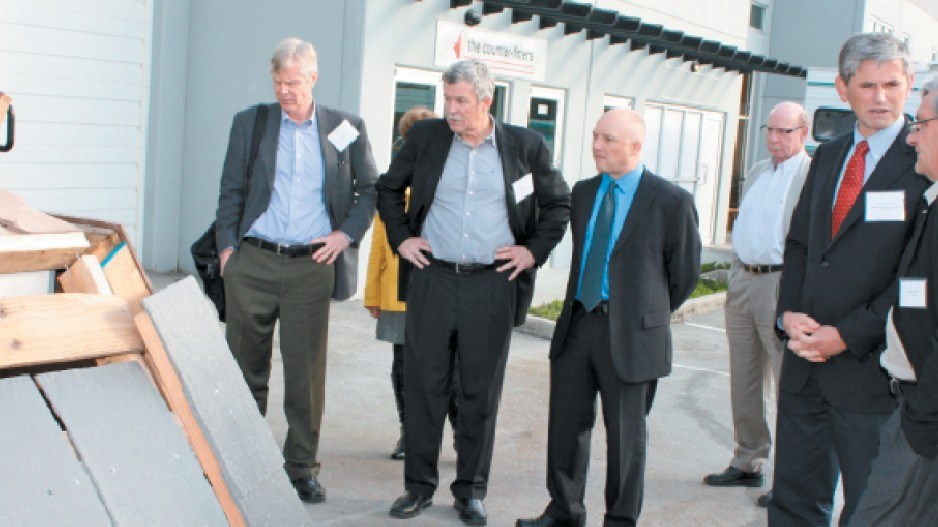In a small shop in a light industrial district of Burnaby, workers with GR Green Building Products Inc. are producing shingles for roofing made from recycled plastic milk bottles and limestone.
Meanwhile, a company called Reforus is refining a process that uses polymers and wood fibre from low-value trees to build interlocking panels that can be assembled into a home, Lego-fashion, in a matter of hours – something the company believes will address affordable housing issues, especially in developing countries.
The two startups are among six that have been accepted into the Foresight Cleantech Accelerator Centre, B.C.'s first business accelerator for clean-technology companies.
Funded by the BC Innovation Council (BCIC), Foresight belongs to a network of 10 venture acceleration centres throughout B.C., including Wavefront.
Because only one in 10 tech companies that go through a business accelerator or incubator ever crosses the "valley of death" and makes it to mass-market penetration, most of the startups will fail.
But because research and development is so capital intensive for clean-tech, even those failures will have attracted large amounts of capital and created jobs and intellectual property.
"As they move forward, some of them realize they may be on the wrong track, in which case they exit," said Dean Prelazzi, managing director for BCIC's Acceleration Network. "When they exit, or in some cases when they fail, they walk away with a phenomenal amount of new skills."
The companies that succeed will find the markets for their products to be potentially massive.
Every year, $300 billion is invested in new clean technologies in a global market that, according to one estimate, will be worth $3 trillion by 2020. Canada has about 2% of that market, and B.C. leads the country when it comes to clean-tech.
"If we can maintain that position, that's $60 billion of clean-tech business in Canada, and that essentially rivals the automotive industry – it's huge," said Foresight president Neil Huff. "In British Columbia, we're much better positioned to be a leader in clean-tech than, obviously, we ever were in the automotive industry."
"Vancouver's home to about one quarter of all the clean-tech companies in the country," said Andrew Wilkinson, B.C.'s minister of Technology and Innovation.
In addition to global markets, there will be a domestic market for those clean technologies related to improving energy efficiencies or addressing environmental concerns in resources industries.
"There are going to be a lot of opportunities for this sector with the growth of natural gas," Wilkinson said.
Accelerators like Foresight don't provide financial aid. Instead, they help new companies gain access to investors and markets and provide the mentorship they need to move more quickly into commercialization.
Foresight has three CEOs in residence who will provide that advice:
- Chris Reid, founder of Cellex Power Products, which sold to Plug Power Inc. (Nasdaq:PLUG) in 2007, current chairman of Hydrexia's board of directors and Acetech director;
- Beth Loughey, a Silicon Valley import who founded Exluna Inc., a rendering software company acquired by NVIDIA Corp.;
- John Bruce, former executive for Cellex, Creo Products and Ventures West.
Foresight accelerator centre roll call
Clean-tech isn't so much an industry as a "zip code" used for institutional investment purposes, said Dallas Kachan, owner of clean-tech consulting firm Kachan and Co. Although it can include clean energy, like wind and solar, it generally refers to technologies that reduce energy consumption and resource depletion or deals with air, water and soil pollution.
Startups enrolled in the Foresight accelerator centre are:
- Emergent Waste Solutions – uses landfill waste as a feedstock to produce activated carbon (charcoal is one type), fertilizer and fuel oil through pyrolysis – an alternative to incineration;
- GR Green Building Products Inc. – makes roofing materials from recycled plastic milk bottles, grocery bags and limestone;
- Terrella Energy Systems Inc. – has developed a manufacturing process for embossing with graphite, which is used to diffuse heat in a wide range of applications, including automotive cooling systems and industrial waste and heat management;
- SprayWerx Technologies Inc. – makes a thermal spray technology for coating metals to reduce wear and corrosion, with a focus on aerospace and oil and gas sectors;
- Reforus – developed a process that combines polymers with wood fibre from low-value trees to build interlocking panels that can be used to assemble low-cost homes; and
- Hydra Energy – provides free engine conversions to allow commercial trucks to burn either gasoline or hydrogen. The company sells trucking fleets hydrogen fuel, which is clean burning, and which it gets from chemical plants, where it is produced as a byproduct.




